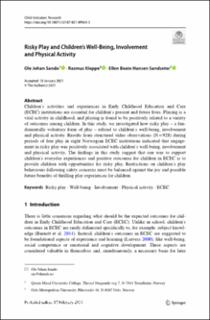Risky Play and Children’s Well-Being, Involvement and Physical Activity
Peer reviewed, Journal article
Published version
Permanent lenke
https://hdl.handle.net/11250/2737151Utgivelsesdato
2021Metadata
Vis full innførselSamlinger
- Artikler (Articles) [173]
- Publikasjoner fra Cristin - DMMH [138]
Sammendrag
Children’s activities and experiences in Early Childhood Education and Care (ECEC) institutions are essential for children’s present and future lives. Playing is a vital activity in childhood, and playing is found to be positively related to a variety of outcomes among children. In this study, we investigated how risky play – a fundamentally voluntary form of play – related to children’s well-being, involvement and physical activity. Results from structured video observations (N=928) during periods of free play in eight Norwegian ECEC institutions indicated that engagement in risky play was positively associated with children’s well-being, involvement and physical activity. The fndings in this study suggest that one way to support children’s everyday experiences and positive outcomes for children in ECEC is to provide children with opportunities for risky play. Restrictions on children’s play behaviours following safety concerns must be balanced against the joy and possible future benefts of thrilling play experiences for children.

